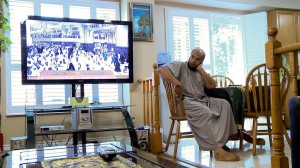The Secret Trial 5 takes a look at Canada’s unethical security-related legal practices
The majority of you reading these words are probably not going to end up spending multiple years in jail. If you were to, the chances are that you would know what you were being charged with, and hopefully have a fair trial.
When compared to other parts of the world, Canada is generally considered to be a country that has a strong, fair justice system. However, the individuals in The Secret Trial 5—next week’s Cinema Politica screening—didn’t receive this expected treatment.

The movie examines the cases of five men who were imprisoned in the name of a “security certificate.” This is a section of Canadian law that is applicable only to non-residents, and as refugee immigrants these five men were subject to it. This certificate allows for individuals to be held in indefinite detention because of so-called secret evidence that is not revealed to them or their counsel. They are asked to legally defend themselves without any knowledge of what they are charged with. The film follows the stories of these five men and their experiences in prison, under house arrest, and within the judicial system of Canada. The Secret Trial 5 does not make a case for the innocence of these individuals, but instead calls for inspection of the unethical judicial conduct in their situations.
Evidence was gathered in secret against these individuals; they were tried in secret, and the arrests occurred unexpectedly. Their families and friends were transformed into full-time activists overnight, helplessly fighting for justice for years. Throughout this struggle, the men didn’t ask for all charges to be dropped—rather, they asked for a fair trial. Fair, in the sense that they would be given more information than the notion that they could possibly present a threat to national security in one way or another.
In the end, these men were never actually proven or even charged as guilty. Even if no longer behind bars, these men’s names are still permanently tainted, and the cloud of suspicion around them will never fully dissipate.
Documentaries are powerful cinematic tools that have the ability to edit materials to favour one side of an argument or frame a situation in an empathy-inducing manner. Although, to a degree, this film enacts these strategies to make its case, its appeal is more analytical. It looks at the facts of the cases in terms of fairness and human rights. This documentary allows for the understanding of an ongoing situation in which a difference can still be made. None of these men have officially been charged with a crime and some are still under house arrest to this day.
Even if the film doesn’t inspire you to militate for their cause, it starts a possible reflection on our judicial system, ethical laws, and our preconceived notions about criminal justice. Law is a powerful tool for preventing harm and criminal activity not only in Canada, but also in every country considered to be fair to its populace. However, it is essential to inform oneself and understand how judicial practices can become misguided, unconstitutional or unethical.
The Secret Trial 5 will be screened by Cinema Politica on Nov. 14. For more information, visit cinemapolitica.org/Concordia.




